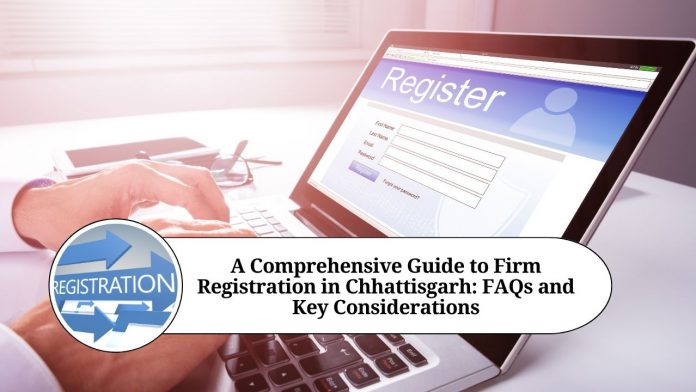A Comprehensive Guide to Firm Registration in Chhattisgarh
Registering a firm is a crucial step towards establishing a legal identity for your business. In Chhattisgarh, the process of firm registration is governed by specific laws and regulations. This blog post aims to provide you with a comprehensive guide on how to register a firm in Chhattisgarh, highlighting the essential steps and requirements involved.
Understanding the Types of Firms in Chhattisgarh:
Before diving into the registration process, it’s important to familiarize yourself with the different types of firms recognized in Chhattisgarh. These include Sole Proprietorship, Partnership Firm, Limited Liability Partnership (LLP), and Private and Public Limited Companies.
Choosing the Right Business Structure:
Selecting the appropriate business structure is a crucial decision. Factors such as liability, ownership, and compliance requirements play a significant role in determining the ideal structure for your firm. Take the time to research and seek professional advice to make an informed choice.
Obtaining Digital Signature Certificates (DSCs):
To proceed with firm registration, obtaining Digital Signature Certificates (DSCs) for the designated partners or directors is mandatory. DSCs are used for online filing and authentication purposes. These certificates can be obtained from certified authorities.
Obtaining Director Identification Number (DIN):
For private and public limited companies, directors need to obtain a Director Identification Number (DIN) from the Ministry of Corporate Affairs (MCA). DIN is a unique identification number issued to individuals appointed as directors of companies.
Applying for Name Approval:
Choosing an appropriate and unique name for your firm is crucial. In Chhattisgarh, you need to apply for name approval through the Ministry of Corporate Affairs. Ensure that the name adheres to the guidelines and is not similar to any existing firms.
Drafting and Filing the Incorporation Documents:
After obtaining the necessary approvals, it’s time to draft and file the incorporation documents. These include the Memorandum of Association (MoA) and Articles of Association (AoA) for companies or the Partnership Deed for partnership firms. Make sure to carefully review the documents for accuracy before submitting them.
Acquiring the Certificate of Incorporation:
Once the documents are submitted and verified, the concerned authority will issue the Certificate of Incorporation. This document serves as proof of your firm’s legal existence and is essential for conducting business operations.
Obtaining Additional Registrations and Licenses:
Depending on the nature of your firm’s activities, you may need to obtain additional registrations and licenses. These may include Goods and Services Tax (GST) registration, professional tax registration, and licenses specific to your industry or business activities.
Complying with Ongoing Requirements:
After successfully registering your firm, it is important to comply with the ongoing requirements imposed by the regulatory authorities. This includes filing annual returns, maintaining proper books of accounts, and adhering to
Seeking Professional Assistance:
While the firm registration process in Chhattisgarh can be done independently, it is highly recommended to seek professional assistance from legal experts or chartered accountants. They possess the knowledge and experience to guide you through the intricacies of the registration process, ensuring that you meet all the necessary requirements and comply with legal obligations.
Understanding Taxation and Compliance:
Once your firm is registered, it is essential to have a clear understanding of the tax obligations and compliance requirements imposed by the government. This includes registering for taxes such as Goods and Services Tax (GST) and understanding the filing and payment schedules. Compliance with tax regulations is crucial to avoid penalties and maintain a good standing with the tax authorities.
Navigating Labor Laws and Employment Regulations:
As an employer in Chhattisgarh, it is vital to be aware of and comply with labor laws and employment regulations. These include minimum wages, working hours, employee benefits, and safety standards. Familiarize yourself with these regulations to ensure a harmonious and legally compliant work environment for your employees.
Maintaining Proper Accounting and Bookkeeping:
Accurate and transparent financial records are crucial for the smooth operation of your firm. Maintain proper accounting and bookkeeping practices to track income, expenses, and assets. This will not only help you make informed business decisions but also ensure compliance with auditing requirements and financial reporting standards.
Protecting Intellectual Property (IP):
If your firm involves innovative products, processes, or trademarks, it is essential to safeguard your intellectual property rights. Consult with intellectual property professionals to understand the necessary steps for obtaining patents, trademarks, or copyrights. Protecting your IP assets can prevent unauthorized use and give your firm a competitive edge in the market.
Adapting to Regulatory Changes:
The regulatory landscape is subject to changes and updates. Stay informed about any new laws, regulations, or amendments that may impact your firm’s operations. Regularly review and update your processes and policies to ensure compliance with the latest legal requirements. This proactive approach will help you avoid penalties and legal complications in the future.
Embracing Digital Transformation:
In today’s digital age, embracing technology and digital transformation is essential for the growth and success of your firm. Explore digital tools and platforms that can streamline your operations, improve efficiency, and enhance customer experiences. From cloud-based accounting software to online marketing strategies, leverage technology to stay competitive in the market.
Conclusion:
Registering a firm in Chhattisgarh requires careful consideration, adherence to legal procedures, and ongoing compliance with regulations. By understanding the registration process, seeking professional assistance, and staying updated with legal requirements, you can establish a solid foundation for your business in Chhattisgarh. Remember, the registration process is just the beginning; ongoing compliance and adaptability are key to long-term success.
Read More Useful Content:
Q.What is the minimum requirement for registering a firm in Chhattisgarh?
The minimum requirement for registering a firm in Chhattisgarh depends on the type of firm. For a partnership firm, a minimum of two partners is required. For a private limited company, a minimum of two directors and shareholders is required, while for a public limited company, a minimum of three directors and shareholders is required.
Q.How long does it take to register a firm in Chhattisgarh?
The time taken to register a firm in Chhattisgarh can vary depending on various factors, including the type of firm and the completeness of the application. On average, it can take anywhere between 15 to 30 days to complete the registration process.
Q.Can a foreign national or NRI register a firm in Chhattisgarh?
Yes, foreign nationals and NRIs (Non-Resident Indians) can register a firm in Chhattisgarh. However, certain conditions and regulations may apply, and it is advisable to consult with legal experts to understand the specific requirements and procedures for foreign individuals.
Q.What is the cost involved in firm registration in Chhattisgarh?
The cost of firm registration in Chhattisgarh can vary based on several factors, such as the type of firm, professional fees, government fees, and any additional services required. It is recommended to consult with professionals to get an accurate estimate of the costs involved.
Q.Can I change the name of my firm after registration?
Yes, it is possible to change the name of your firm after registration. However, the process and requirements for name change may vary, and it is advisable to consult with legal professionals to understand the specific procedures and documentation involved.
Q.Do I need a physical office space to register a firm in Chhattisgarh?
While having a physical office space is not mandatory at the time of firm registration, you will need to provide a registered office address for official communication. This address can be a commercial space or a residential address, but it should be accessible and available for communication.
Q.Can I register my firm online in Chhattisgarh?
Yes, the registration process for firms in Chhattisgarh can be done online through the Ministry of Corporate Affairs (MCA) portal. However, certain documents and forms may require physical submission or notarization. Online registration offers convenience and efficiency in the process.
Q.Are there any post-registration compliance requirements?
Yes, after firm registration, there are ongoing compliance requirements that need to be fulfilled. This includes filing annual returns, maintaining proper books of accounts, conducting audits (if applicable), and complying with tax-related obligations such as GST returns and income tax filings.
Q.Can I convert my partnership firm into a private limited company in Chhattisgarh? Yes, it is possible to convert a partnership firm into a private limited company in Chhattisgarh. The process for conversion involves certain legal formalities and requirements, including obtaining consent from partners and fulfilling the guidelines set by the Ministry of Corporate Affairs.
Q.Is it necessary to consult legal professionals for firm registration in Chhattisgarh?
While it is not mandatory to consult legal professionals, seeking their guidance is highly recommended. Legal professionals have the knowledge and expertise to guide you through the registration process, ensure compliance with regulations, and minimize any potential legal risks or complications.





















